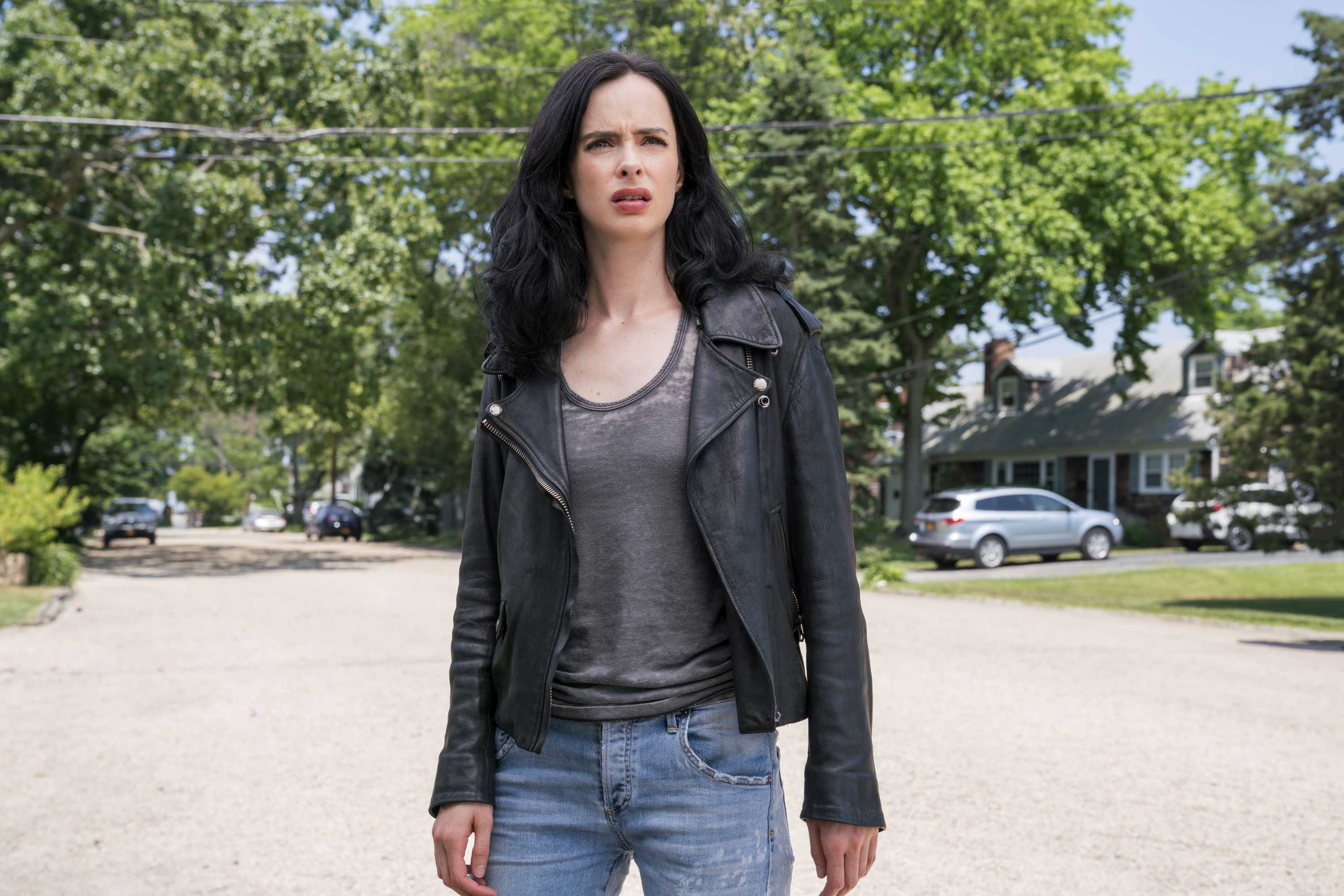The first season of Jessica Jones, Netflix’s critically acclaimed superhero neo-noir series, went out with a bang. When abusive, demented, and lovesick mind-controller Kilgrave (a riveting David Tennant) thinks he finally has Jessica (Krysten Ritter, at her caustic best) under his thumb again, he gives her a command: “let’s start with a smile,” he says mildly, in an age-old echo of chauvinists everywhere. Jessica smiles prettily. But when he demands that she admit her love for him, it’s her sister Trish she looks to when she says the three words. Then, suddenly, she has her hand wrapped around his throat. She’s a survivor, and she has the control. “Smile,” she commands and snaps his neck.
A lot has happened since that moment. Off-screen, we’ve seen powerful movements appear with the intention of bringing sexual violence out of the shadows. There’s been some catharsis, some reckoning, and of course, some backlash. We’ve also seen survivors’ stories represented on television with more nuance and care than ever before, in everything from the award-winning mystery Big Little Lies, to the under-watched Netflix docuseries The Keepers, to two fiery Margaret Atwood adaptations. And of course, since the first season of Jessica Jones aired all the way back in November 2015, we’ve since gained a President with, to say the least, a track record of making demeaning and insulting comments about women.
Jessica herself has changed as well. She still cuts an aggressive figure–armored with a leather jacket and perpetually stormy expression–but while her abuser is six feet under, her PTSD is alive and well. Weirdly, though, her trauma seems to have changed shape to fit the new season narrative, leaving most of its emotional resonance behind. The first thirteen episodes fearlessly and skillfully explored the repeated shattering and reassembling of self that victims of abuse situations endure, and the emotional exhaustion and deep mistrust that follow. This second batch trades most of that in for an unfocused, predictable take on Jessica’s origin story, some undercooked villains, and an inauthentic “Am I a monster?” crisis that reads like a poor homage to Frankenstein.
Meanwhile, Jessica’s sidekicks who in season one felt like vital moving pieces of a larger story are now relegated to B and C storylines that are in turn boring and outlandish. None is more unbearable than that of Jessica’s on-and-off lawyer, Jeri Hogarth (Carrie-Anne Moss). To be clear, Moss does her best with what she’s been given–the cast is jam-packed with talented actors–but she can only elevate her character’s dull storyline for so long. Jeri is a generally conniving person with only tangential ties to Jessica, but after we learn (from a cliched, silent we’ve-got-bad-news scene in the premiere) that she has a serious health issue, she becomes a declawed house cat. She spends her overabundance of screen time in the next several episodes sitting in presumably introspective silence, or coked up and dancing in slow motion, asking relative strangers (some of whom also inexplicably stick around for multiple episodes) things like, “Do you believe in karma?” The character is becoming painfully aware of her own mortality, but it’s a process we’re not invested in because she’s never even ranked among Hell’s Kitchen’s top five most interesting characters.
Other characters don’t fare much better. Luke Cage is gone, which is expected but still feels like a punch through the fabric of the show. A convoluted bit of writing leads Trish (Rachael Taylor) into a drawn-out, regressive plot point that’s cringingly reminiscent of a much-maligned arc in Lost’s second season. In another questionable writing choice, a new character is introduced, set up as Jessica’s rival, and then quickly pivots into a potential love interest. Other new characters are introduced with emphasis before disappearing for entire stretches of the season.
Perhaps most disappointing of all, much of the visual flair that solidified season one as a vital entry into the neo-noir canon is now absent. In an admirable choice by creator Melissa Rosenberg, a slate of all-female directors brought this season’s episodes to life. Some, like fourth episode director Deborah Chow, are able to juggle Jessica’s kinetic energy and unsettled emotional well, incorporating both into memorable sequences that bookend the hour. But for the most part, the filmmaking is unremarkable, in part because the specter of Kilgrave’s stunning, terrifying tableaus looms large and irreplaceable, barely challenged by Hell’s Kitchen’s graceless new villains.
Make no mistake, this is still Jessica Jones. Our hero has rough, superpowered sex in a grimy bathroom stall, threatens most of the people she meets, and spits lines like “I can repress feelings all day.” The feminist ideology that underscored season one may not be as cohesive, but it’s still present and authentic in every episode. The words ‘prejudice’ and ‘discrimination’ are mentioned more than once, in reference to gender, sexuality, and superpoweredness. When Jessica finds out about another victim of the doctor who experimented on her, she digs into the topic, focused on the patient’s inability to consent to treatment. And when a woman tells a male friend that he’s going to hear something about her today that she won’t want to speak about again, that take on the elusive nature of naming trauma feels as real as anything in season one.
Season two of Jessica Jones isn’t the worst thing Marvel has put on television, nor the worst thing Netflix has put on the air this year: it’s just unnecessary, a jumbled afterthought to what could have done well as a near-perfect miniseries. When Jessica ended Kilgrave’s cycle of abuse, it meant something. Even though she was broken beyond belief, she was also undeniably strong. All of that is still true, but where season one made the story of Alias Investigations feel profound, by season two it just feels pointless.

